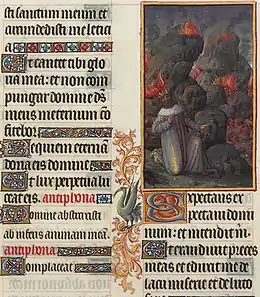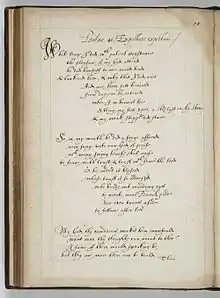Psalm 40
Psalm 40 is the 40th psalm of the Book of Psalms, beginning in English in the King James Version: "I waited patiently for the LORD". The Book of Psalms is part of the third section of the Hebrew Bible, and a book of the Christian Old Testament. In the slightly different numbering system used in the Greek Septuagint and Latin Vulgate translations of the Bible, this psalm is Psalm 39. In Latin, it is known by the incipit, "Expectans expectavi Dominum".[1] It is described by the Jerusalem Bible as a "song of praise and prayer for help".[2]
| Psalm 40 | |
|---|---|
| "I waited patiently for the LORD" | |
 Psalm 40 in Les Très Riches Heures du duc de Berry, Musée Condé, Chantilly | |
| Other name |
|
| Text | attributed to King David |
| Language | Hebrew (original) |
| Psalm 40 | |
|---|---|
← Psalm 39 Psalm 41 → | |
| Book | Book of Psalms |
| Hebrew Bible part | Ketuvim |
| Order in the Hebrew part | 1 |
| Category | Sifrei Emet |
| Christian Bible part | Old Testament |
| Order in the Christian part | 19 |
Psalm 40 is used in both Jewish and Christian liturgies. It has been set to music, Baroque settings and U2's song "40" from their 1983 album, War. Two composers used the beginning for symphonic compositions, Mendelssohn's Lobgesang and Stravinsky's Symphony of Psalms.
Text
Hebrew Bible version
The following is the Hebrew text of Psalm 40:[3]
| Verse | Hebrew |
|---|---|
| 1 | .לַמְנַצֵּחַ, לְדָוִד מִזְמוֹר |
| 2 | .קַוֺּה קִוִּיתִי יְהוָה; וַיֵּט אֵלַי, וַיִּשְׁמַע שַׁוְעָתִי |
| 3 | :וַיַּעֲלֵנִי, מִבּוֹר שָׁאוֹן-- מִטִּיט הַיָּוֵן
.וַיָּקֶם עַל-סֶלַע רַגְלַי; כּוֹנֵן אֲשֻׁרָי |
| 4 | :וַיִּתֵּן בְּפִי, שִׁיר חָדָשׁ-- תְּהִלָּה לֵאלֹהֵינוּ
.יִרְאוּ רַבִּים וְיִירָאוּ; וְיִבְטְחוּ, בַּיהוָה |
| 5 | ;אַשְׁרֵי הַגֶּבֶר-- אֲשֶׁר-שָׂם יְהוָה, מִבְטַחוֹ
.וְלֹא-פָנָה אֶל-רְהָבִים, וְשָׂטֵי כָזָב |
| 6 | --רַבּוֹת עָשִׂיתָ, אַתָּה יְהוָה אֱלֹהַי
אֵין, עֲרֹךְ אֵלֶיךָ--אַגִּידָה וַאֲדַבֵּרָה; עָצְמוּ, מִסַּפֵּר |
| 7 | ;זֶבַח וּמִנְחָה, לֹא-חָפַצְתָּ-- אָזְנַיִם, כָּרִיתָ לִּי
.עוֹלָה וַחֲטָאָה, לֹא שָׁאָלְתָּ |
| 8 | .אָז אָמַרְתִּי, הִנֵּה-בָאתִי: בִּמְגִלַּת-סֵפֶר, כָּתוּב עָלָי |
| 9 | .לַעֲשׂוֹת-רְצוֹנְךָ אֱלֹהַי חָפָצְתִּי; וְתוֹרָתְךָ, בְּתוֹךְ מֵעָי |
| 10 | :בִּשַּׂרְתִּי צֶדֶק, בְּקָהָל רָב-- הִנֵּה שְׂפָתַי, לֹא אֶכְלָא
יְהוָה, אַתָּה יָדָעְתָּ |
| 11 | ;צִדְקָתְךָ לֹא-כִסִּיתִי, בְּתוֹךְ לִבִּי-- אֱמוּנָתְךָ וּתְשׁוּעָתְךָ אָמָרְתִּי
.לֹא-כִחַדְתִּי חַסְדְּךָ וַאֲמִתְּךָ, לְקָהָל רָב |
| 12 | ;אַתָּה יְהוָה-- לֹא-תִכְלָא רַחֲמֶיךָ מִמֶּנִּי
.חַסְדְּךָ וַאֲמִתְּךָ, תָּמִיד יִצְּרוּנִי |
| 13 | --כִּי אָפְפוּ-עָלַי רָעוֹת, עַד-אֵין מִסְפָּר
;הִשִּׂיגוּנִי עֲוֺנֹתַי, וְלֹא-יָכֹלְתִּי לִרְאוֹת עָצְמוּ מִשַּׂעֲרוֹת רֹאשִׁי, וְלִבִּי עֲזָבָנִי |
| 14 | רְצֵה יְהוָה, לְהַצִּילֵנִי; יְהוָה, לְעֶזְרָתִי חוּשָׁה |
| 15 | :יֵבֹשׁוּ וְיַחְפְּרוּ, יַחַד-- מְבַקְשֵׁי נַפְשִׁי, לִסְפּוֹתָהּ
.יִסֹּגוּ אָחוֹר, וְיִכָּלְמוּ-- חֲפֵצֵי, רָעָתִי |
| 16 | .יָשֹׁמּוּ, עַל-עֵקֶב בָּשְׁתָּם-- הָאֹמְרִים לִי, הֶאָח הֶאָח |
| 17 | :יָשִׂישׂוּ וְיִשְׂמְחוּ, בְּךָ-- כָּל-מְבַקְשֶׁיךָ
.יֹאמְרוּ תָמִיד, יִגְדַּל יְהוָה-- אֹהֲבֵי, תְּשׁוּעָתֶךָ |
| 18 | :וַאֲנִי, עָנִי וְאֶבְיוֹן-- אֲדֹנָי יַחֲשָׁב-לִי
.עֶזְרָתִי וּמְפַלְטִי אַתָּה; אֱלֹהַי, אַל-תְּאַחַר |
King James Version
- I waited patiently for the LORD; and he inclined unto me, and heard my cry.
- He brought me up also out of an horrible pit, out of the miry clay, and set my feet upon a rock, and established my goings.
- And he hath put a new song in my mouth, even praise unto our God: many shall see it, and fear, and shall trust in the LORD.
- Blessed is that man that maketh the LORD his trust, and respecteth not the proud, nor such as turn aside to lies.
- Many, O LORD my God, are thy wonderful works which thou hast done, and thy thoughts which are to us-ward: they cannot be reckoned up in order unto thee: if I would declare and speak of them, they are more than can be numbered.
- Sacrifice and offering thou didst not desire; mine ears hast thou opened: burnt offering and sin offering hast thou not required.
- Then said I, Lo, I come: in the volume of the book it is written of me,
- I delight to do thy will, O my God: yea, thy law is within my heart.
- I have preached righteousness in the great congregation: lo, I have not refrained my lips, O LORD, thou knowest.
- I have not hid thy righteousness within my heart; I have declared thy faithfulness and thy salvation: I have not concealed thy lovingkindness and thy truth from the great congregation.
- Withhold not thou thy tender mercies from me, O LORD: let thy lovingkindness and thy truth continually preserve me.
- For innumerable evils have compassed me about: mine iniquities have taken hold upon me, so that I am not able to look up; they are more than the hairs of mine head: therefore my heart faileth me.
- Be pleased, O LORD, to deliver me: O LORD, make haste to help me.
- Let them be ashamed and confounded together that seek after my soul to destroy it; let them be driven backward and put to shame that wish me evil.
- Let them be desolate for a reward of their shame that say unto me, Aha, aha.
- Let all those that seek thee rejoice and be glad in thee: let such as love thy salvation say continually, The LORD be magnified.
- But I am poor and needy; yet the Lord thinketh upon me: thou art my help and my deliverer; make no tarrying, O my God.
Structure
The first part of the Psalm (verses 1-11) is one in the series of psalms of thanksgiving of an individual. Verses 13-18, possibly set originally in an independent Psalm context, are virtually identical to Psalm 70. This part belongs more in the group of psalms of lament. Matthew Henry divides the psalm into three sections:
- Confidence for deliverance (verses 1-5)
- Christ's work of redemption (6-10)
- A prayer for mercy and grace (11-17).[4]
Interpretation
Some writers see verses 6-9 as prophetic of Jesus,[5][6] or of the messiah generally.[7]
John Wesley saw it as a prayer of salvation.[8]
Uses

Judaism
- Verse 2 is found in the repetition of the Amidah during Rosh Hashanah.[9]
- Verse 12 is the second verse from V'hu Rachum in Pesukei Dezimra,[10] and the long Tachanun recited on Mondays and Thursdays.[11]
New Testament
Verses 6-8 are quoted in Hebrews 10:5–7.[12]
This phrase "I delight to do your will" is also contrasted with the verse in the same Psalm where "They delight to do me harm". This adds to this imagery portending the plots against and betrayal of Jesus. The following Psalm 41 is also seen by the New Testament to portend the betrayal of Jesus by Judas.
Book of Common Prayer
In the Church of England's Book of Common Prayer, this psalm is appointed to be read on the morning of the eighth day of the month,[13] as well as at Mattins on Good Friday.[14]
Music
Heinrich Schütz wrote a setting of a paraphrase of Psalm 40 in German, "Ich harrete des Herren", SWV 137, for the Becker Psalter, published first in 1628. Mendelssohn used the beginning in German as the text for the fifth movement from his Lobgesang. The same verses in Latin form the text of the second movement of Stravinsky's Symphony of Psalms.
The Psalm was used in U2's song "40", the final track from their 1983 album, War.
A song by The Mountain Goats titled "Psalm 40:2" appears on their 2009 album The Life of the World to Come, inspired by this verse.[15]
References
- Parallel Latin/English Psalter / Psalmus 39 (40) medievalist.net
- Jerusalem Bible (1966), Sub-heading for Psalm 40
- "Psalms Chapter 40 תְּהִלִּים". mechon-mamre.org. Retrieved 17 September 2022.
- Henry, M., Matthew Henry’s Concise Commentary, accessed 5 November 2021
- "Psalm 40:1 Commentary - The Treasury of David". biblestudytools.com.
- Charles Spurgeon,Treasury of David Archived 2015-11-26 at the Wayback Machine
- Coffman's Commentaries on the Bible.
- "Psalm 40 Bible Commentary - Wesley's Explanatory Notes". www.christianity.com.
- The Complete Artscroll Machzor for Rosh Hashanah, page 353
- The Complete Artscroll Siddur, page 62
- The Complete Artscroll Siddur, page 125
- Kirkpatrick, A. F. (1901). The Book of Psalms: with Introduction and Notes. The Cambridge Bible for Schools and Colleges. Vol. Book IV and V: Psalms XC-CL. Cambridge: At the University Press. p. 838. Retrieved February 28, 2019.
- Church of England, Book of Common Prayer: The Psalter as printed by John Baskerville in 1762, pp. 196ff
- "The Book of Common Prayer: Proper Psalms On Certain Days" (PDF). The Church of England. p. 6. Retrieved 19 April 2023.
- "The Mountain Goats: The Life of the World to Come | Album Reviews". Pitchfork. 2009-10-14. Retrieved 2012-02-28.
External links
- Psalm 40 in Hebrew and English - Mechon-mamre
- Pieces with text from Psalm 40: Scores at the International Music Score Library Project
- Psalm 40: Free scores at the Choral Public Domain Library (ChoralWiki)
- Text of Psalm 40 according to the 1928 Psalter
- Psalm 40 – The Servant Comes to Do God’s Will text and detailed commentary, enduringword.com
- For the leader. A psalm of David. / Surely, I wait for the LORD; who bends down to me and hears my cry text and footnotes, usccb.org United States Conference of Catholic Bishops
- Psalm 40:1 introduction and text, biblestudytools.com
- Psalm 40 / Refrain: Great are the wonders you have done, O Lord my God. Church of England
- Psalm 40 at biblegateway.com
- Hymns for Psalm 40 hymnary.org